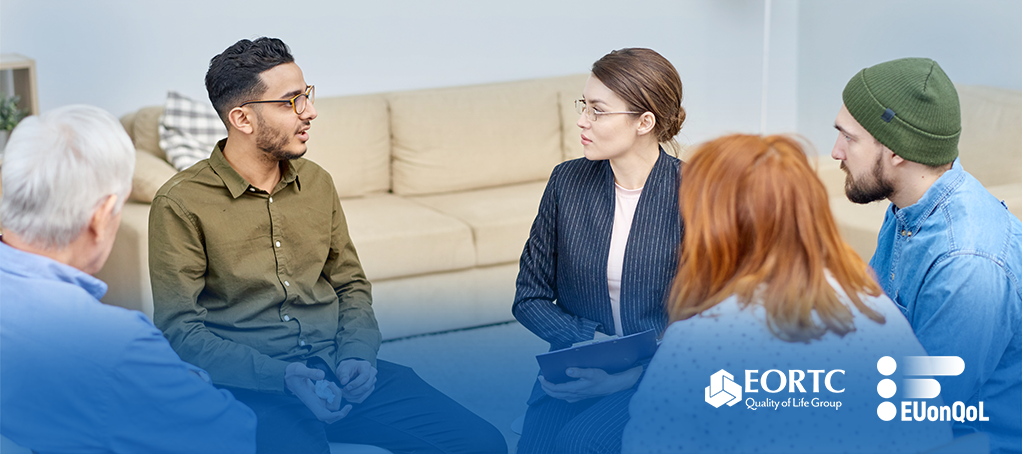EORTC QLG proudly collaborates on the EUonQoL project
21 Mar 2023
Brussels, 21 March 2023 – The European Organisation for Research and Treatment of Cancer (EORTC), through its Quality of Life Group (QLG) network, is proud to announce that it is participating in the EUonQoL project. This project is receiving funding from the European Union’s Horizon Europe research framework programme under the Cancer Mission (grant agreement 101096362).
For the past 60 years, the EORTC has been leading research aimed at improving survival and Quality of Life (QoL) in cancer patients. This new project will provide the EORTC with the opportunity to share its expertise for the development of the EUonQoL toolkit, which will constitute a new European reference for the assessment of QoL in oncology. This project is a unique opportunity to give a voice to European cancer patients and tailor the appropriate QoL tools to answer their needs.
A new barometer for the assessment of QoL of cancer patients and survivors in Europe
The EUonQoL project is a European multi-stakeholder consortium, involving research institutions, cancer centres, as well as scientific, professional, and patient representative organisations, all with extensive experience and robust scientific background in the development of self-report QoL measures. It aims to develop, pilot, and validate a patient-driven and unified system for assessment of QoL (EUonQoL toolkit) in cancer patients and survivors across Europe.
This fully digital toolkit will allow the collection of QoL reports from cancer patients and survivors across Europe to inform policy changes at the EU level. The development of the EUonQoL toolkit will take into account different cancer populations to ensure a better representation of patients and survivors who have experienced different types of cancer. Project leaders from Istituto Nazionale dei Tumori (Italy), Dr Cinzia Brunelli and Prof Giovanni Apolone, shared that: “The plan is for the EUonQoL toolkit to be used repeatedly throughout the years to monitor how various EU cancer programmes have contributed to the quality of life of cancer patients and survivors.”
EORTC, a recognised organisation in advocating for the importance of QoL of cancer patients in Europe and beyond
Based on its strong expertise in the development of QoL questionnaires, and representation as the largest network of QoL researchers within Europe, the EORTC was approached to be part of the consortium.
The EORTC Quality of Life Department (QLD) coordinates and supports the scientific work of the QLG, with over 30 years of experience in evaluating the development of QoL measures and their use in cancer trials. Based on its expertise in this field, the EORTC QLD, together with Hospital del Mar Medical Research Institute (Spain), will lead a work package that aims to identify the appropriate measurement tools and relevant QoL issues to be included in the EUonQoL toolkit.
Members of the QLG network are important contributors to the consortium, with Prof Galina Velikova from the University of Leeds (UK) leading the development of the toolkit itself (WP4) and Prof Mogens Groenvold from the University of Copenhagen (Denmark) leading the implementation of the computer adaptive testing (CAT) measure. The CAT is a digital QoL assessment tool that tailors the questions to the experiences of each patient in real-time, thus providing higher measurement precision.
Dr Madeline Pe, Head of the EORTC QLD and Dr Jaap Reijneveld, Chair of the EORTC QLG, commented that: “We are very excited to be part of this important project and share our network’s knowledge and expertise in developing a toolkit that will become a new standard to assess QoL among European cancer patients and survivors. This project is very much in line with EORTC’s mission to improve the quality of life of those affected by cancer.”
About EORTC
The European Organisation for Research and Treatment of Cancer (EORTC) is a non-governmental, non-profit organisation, which unites clinical cancer research experts, throughout Europe, to define better treatments for cancer patients to prolong survival and improve quality of life. Spanning from translational to large, prospective, multi-centre, phase III clinical trials that evaluate new therapies and treatment strategies as well as patient quality of life, its activities are coordinated from EORTC Headquarters, a unique international clinical research infrastructure, based in Brussels, Belgium.
About the Quality of Life Group
The Quality of Life Group (QLG) strives to improve health-related quality of life (HRQoL) of cancer patients, through dedicated research and the use of HRQoL measures within cancer clinical trials and clinical practice. HRQoL constitutes an important aspect of cancer research and care: it gives a voice to patients, putting their experience at the forefront. The QLG is part of the European Organisation for Research and Treatment of Cancer (EORTC).
For further information, please visit the QLG website.
Contact
Caroline Hance (EORTC QLG)
Strategic Lead Communication
caroline.hance@eortc.org
Related News
EORTC: Advancing research and treatment for rare cancers
29 Feb 2024
EORTC Fellowship Programme: celebrating more than 20 years of impactful collaboration
22 Feb 2024
Appointment of Malte Peters as EORTC Strategic Alliance Officer
9 Feb 2024
Unique series of workshops in partnership with the European Medicines Agency (EMA)
7 Feb 2024
EORTC launches a prominent clinical trial in older patients with locally advanced (LA) HNSCC (Head and Neck Squamous Cell Carcinoma)
14 Dec 2023
Seven IMMUcan abstracts selected for ESMO Immuno-Oncology Congress 2023
6 Dec 2023
EORTC Quality of Life measures integrated in CDISC
20 Nov 2023
EORTC and Immunocore are collaborating to launch the ATOM clinical trial of tebentafusp in Adjuvant Uveal Melanoma
7 Nov 2023
Treatment with decitabine resulted in a similar survival and fewer adverse events compared with conventional chemotherapy in older fit patients with acute myeloid leukaemia
31 Oct 2023
New results and forthcoming EORTC trials in rare cancers, lung, head and neck, and breast carcinomas presented at ESMO 2023
20 Oct 2023


